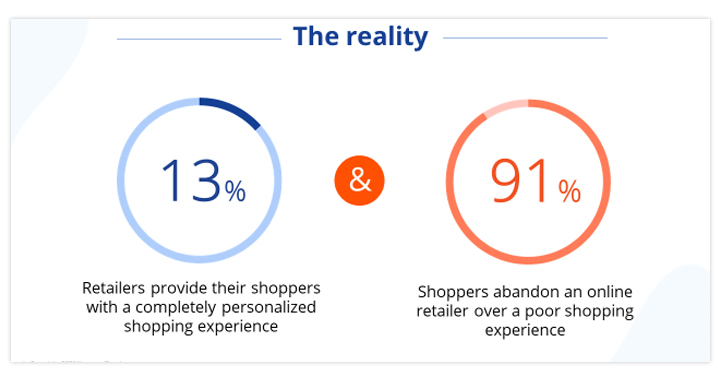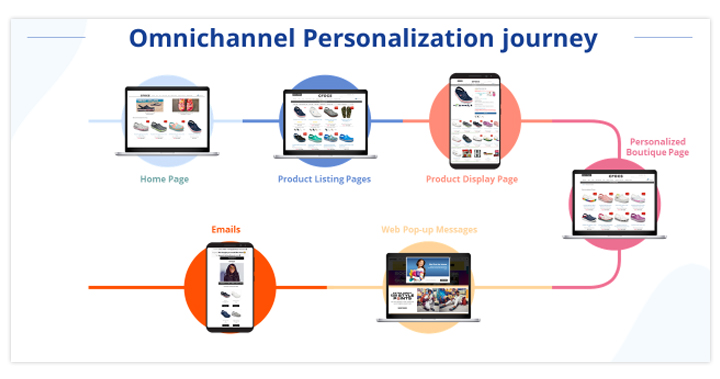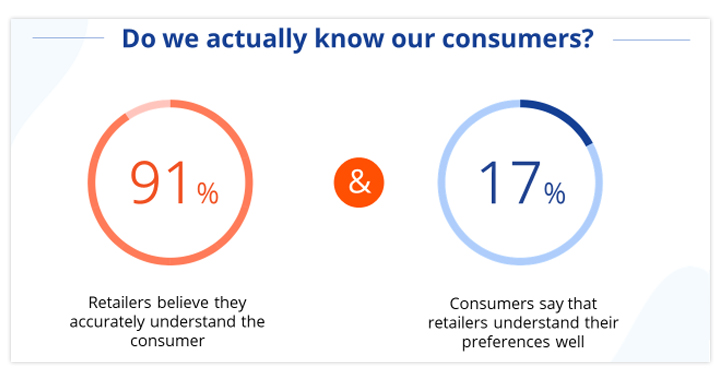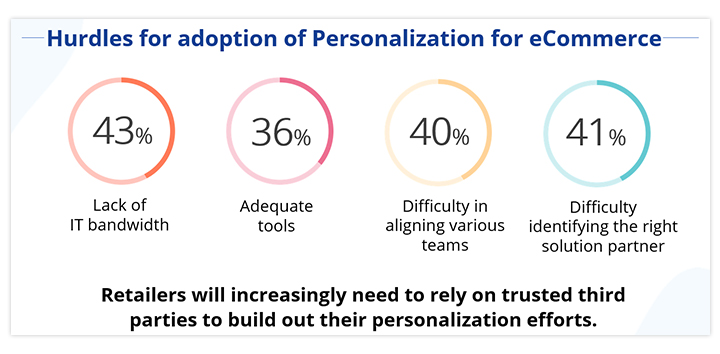For an eCommerce brand, success relies on providing a unique and personalized customer experience.
Offering a complete personalized experience fosters loyalty and boosts conversions by making customers feel more connected to the brand.
As personalization becomes the norm in the ecommerce world, brands are continuously optimizing their platform.
However, only a few have completely embraced it in its true essence. Why? Because personalization is challenging to execute without the proper insight into your customer’s behavior.

As most B2C brands try to personalize their stock-in-trade, the spotlight on key trends in ecommerce personalization is intensifying.
An overwhelming 91% of shoppers would abandon an online retailer over a poor shopping experience.
The need to make personalization a strategic priority has never been greater. Only 41% of retail executives say their eCommerce platform is somewhat personalized at best— while just 13% of online retailers provide shoppers with a completely personalized experience (Report).
The reality is that most brands are falling short of delivering the eCommerce personalized experiences that their customers expect.
So how can brands successfully establish processes to understand their customers’ behaviors? How can omnichannel personalization help drive higher revenue? Let’s take a closer look at some of these burning questions.
Omnichannel personalization
Brands must embrace a more customer-obsessed framework that helps engage with visitors in both the digital and the physical worlds.
It’s high time brands deliver personalized experiences across all channels based on user buying behavior, browsing activity, etc.

Omnichannel personalization is the next big thing in the ecommerce landscape, especially as the digital and physical space continue to blend.
While most brands recognize the importance of omnichannel personalization, 50% say that gathering customer data presents challenges to personalization.
With adequate data, B2C brands can deliver seamless experiences by embracing technology, agile operating processes, and setting KPIs.
Personalized digital experiences like product recommendations, content tailored to user’s behavior, demography, clickstream data, and preferences can significantly increase sales conversion.
Not surprisingly, 7 in 10 retailers who invested in personalizing customer experience have seen an ROI of at least 4X. Personalized experiences also result in lower cart abandonment rates, higher conversion rates, and, invariably, higher revenue per user.
Bridging the customer expectation gap

Most brands claim that they understand the needs of their customers. But reality paints a different picture.
While 91% of retailers believe they accurately understand their customers, only 17% of customers say that retailers know their preferences well.
This wide gorge between the brand’s perception of their customers’ expectations and reality highlights the need to gather and track all relevant data. Active listening is crucial in marketing, as shoppers have numerous choices in today’s market.
Implementing effective personalization becomes an easy feat when B2C brands measure the right metrics. To ensure successful personalization implementation, brands need to understand their customers’ interactions and map each touchpoint along their shopping journey. Personalization directly impacts critical metrics such as customer lifetime value, conversion rate, cart abandonment rate, average order value, and average revenue per user. 60% of retailers see average order value jump by 10% or more after implementing personalization.
Final thoughts
Today’s customers control their shopping experiences, aided by social media and unlimited access to the evolving tech landscape.
They are constantly dictating how, when, and where they want to engage with brands. Ecommerce companies understand modern buyer needs but face hurdles in personalization like limited IT resources and finding suitable technology partners. To truly scale your marketing efforts, consider leveraging a robust ecommerce marketing platform.

Brands must act now or risk being left behind. They need to adopt a more holistic strategy for data management and enhance their entire data and analytics environment to meet changing user expectations.
Retailers will have to rely on innovative technology providers to bolster their personalization efforts. With hyper-personalization being the number one priority for all brands, aligning strategy and technology to deliver next-gen personalization will play a key role in achieving customer-centric business objectives.
“By implementing a one-to-one personalization strategy properly in a highly contextually and relevant fashion, personalization can help retailers cross the crucial threshold of visits and views into what is the sweet spot for driving more conversions more, purchases, and more transactions.”
– Tim Moran, VP – Enterprise Engagement, Netcore Cloud
Empowered with insights from personalization, brands can create more contextually relevant offers and content that is genuinely aligned with customers’ demands.
To help brands understand the latest trends within the space, we’ve created a report where we covered all this and a lot more.
Or, if you’re looking to see these features live in action, book a demo with us today.








